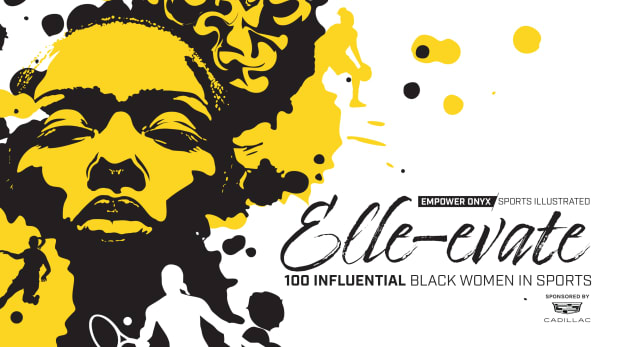With protections for race and gender under great threat, UCLA’s deputy Title IX director braces for the fight of her career.

Courtesy of Candi Smiley
Sports Illustrated and Empower Onyx are putting the spotlight on the diverse journeys of Black women across sports—from the veteran athletes, to up-and-coming stars, coaches, executives and more—in the series, Elle-evate: 100 Influential Black Women in Sports.
The past year of federal case law has been eventful, to say the least. Among other opinions, the Supreme Court overturned the constitutional right to abortion, defended the Second Amendment from strict state limits on carrying guns in public and shot down various efforts by the Biden Administration to federally protect large swaths of the population against COVID-19. All the while Candi Smiley keeps cool. “We all knew this was coming,” she says. “It’s been building for the last couple of years. But, yeah, everyone’s kinda shell-shocked.”
All of these decisions figure to impact Smiley’s work as UCLA’s deputy Title IX director—a role Smiley has occupied for the past three years. And the fact that all this undoing strikes 50 years after the passing of Title IX is an all-too-bitter irony.
Title IX legislation, of course, doesn’t just guarantee women equal opportunity to play sports at colleges and universities. It prohibits any form of gender-based discrimination at any school that receives federal funding. Smiley’s job is to uphold that standard—an especially tall task. Not only does UCLA have a sizable student population—about 45,000, give or take—but it sits inside one of the most progressive states in the union.
Her remit runs the gamut, from preserving fairness in recruiting to ensuring LGBTQ+ students are treated fairly on campus. “It’s a little weird because much to the chagrin of everyone in this realm, everything is siloed,” she says. “So if a student wants to talk about the effects these rulings could have on their lives, they’re not necessarily going to go to the people who work with the policy. They’re gonna go to the counselors, to the advocates and have that conversation—which we encourage. In a way, you kinda need to get the emotion out of your system and figure out what you want do before you come to us. Because we have to be objective and give you the law, as opposed to how we actually may feel about something.”
In cases of campus sexual assault, Smiley’s office is the firewall between students and law enforcement, and the final jury for dispensing discipline. If there’s a common theme, sadly, it’s that no party ever receives their expected outcome—the complainant, not least. “The best emotion you can hope for is relief,” she says.
Smiley’s pragmatic approach would be easy to mistake for indifference if she wasn’t so obviously passionate. Still, if she comes off less excitable than the lot, it’s from hours of studying Matlock casually go about his business in the courtroom. “I remember at six years old watching with my mom and saying, ‘I’m going to do that,’” she says.
Smiley grew up in Indianapolis, a Hoosier through and through, one of four kids—including a fraternal twin sister. Through high school, she played basketball and ran track. At Indiana, she started out with a major in business marketing “because every time I saw anybody in sports law, they were also general counsel and business administration. Something business was always in there.” From there, it was on to Indiana Law, then internships at USA Track and Field and the USTA. An internship at NFL overlapped with the 2001 death of Minnesota Vikings tackle Korey Stringer, which triggered policy-shaping discussions about “whether the athletes were employees or independent contractors,” she says.
Smiley realized early into her career that private practice wasn’t for her. So she freelanced and volunteered until she came across a Facebook post advertising a Title IX coordinator position at Howard University. “I was like, I can actually help people and use my legal degree? This is it!” she says.
At Howard, she saw firsthand just how much harder it is for HBCUs to compete with more well-endowed predominantly white institutions. “When you’re thinking about financial aid, the government is supposed to pay the institution, and the institution is supposed to distribute those funds to the students,” she explains. “What I didn’t understand was … Indiana University has maybe 15% of their students who need Pell Grants, or a pretty low number. And because of the money they have in their coffers, they’re able to front the money and make sure that you have the money as soon as you start school.
“Well, if Howard has 65% of their students who are Pell Grant eligible, they don’t have enough money in their coffers. So they have to use whatever money they have, but then actually have to wait on the government to pay them. So it sounds like HBCUs aren’t handling their business and all these other crazy things, but there are reasons behind it. If school starts in August, but the government doesn’t pay you until October, where are you supposed to get the money from? And what are you supposed to do if the government pays you late?”
After four and a half years in D.C., Smiley has been in UCLA’s Title IX office for almost as long. It’s hard, complicated work—especially in these tumultuous times—with nuances that grow only more opaque. Last month, on the 50th anniversary of Title IX, education secretary Miguel Cardona unveiled plans to undo Trump-era Title IX rollbacks that watered down how schools responded to sexual misconduct complaints that included safeguards for transgender students. But how it impacts their access to sports is still up in the air. Over the weekend, a federal judge temporarily blocked the directive.
For some, this will be cause for frustration. For Smiley, it’s yet another occasion to inhale sharply, roll up her sleeves and facilitate the best compromise. “No one is gonna be completely happy with what they come up with,” she says. “But as long as the goal is inclusion, I think we’ll come to a good place.”

Andrew Lawrence is a contributor for Empower Onyx, a diverse multi-channel platform celebrating the stories and transformative power of sports for Black women and girls.